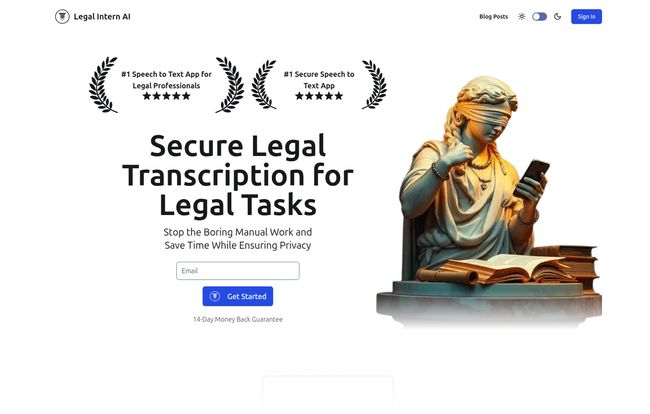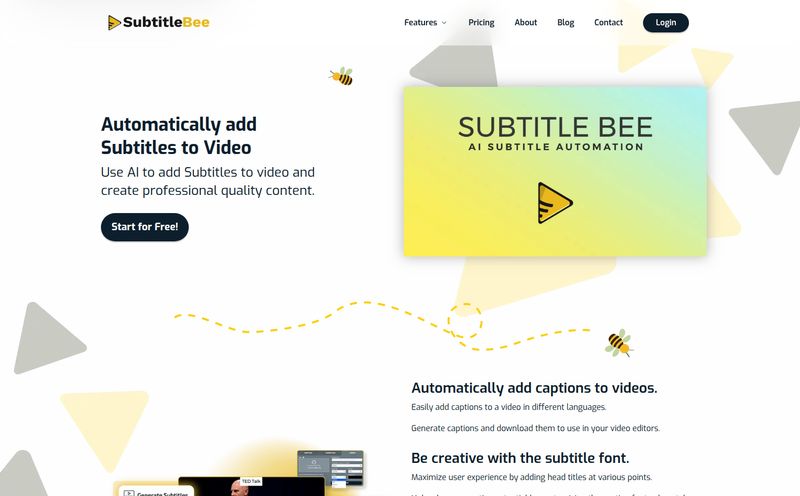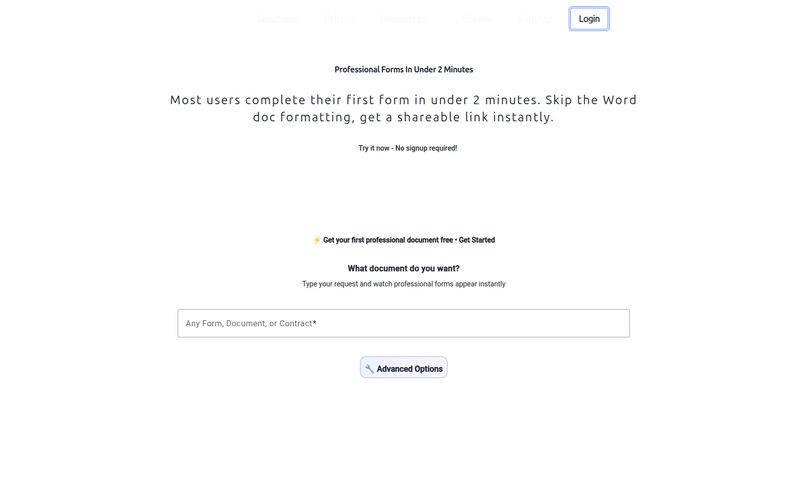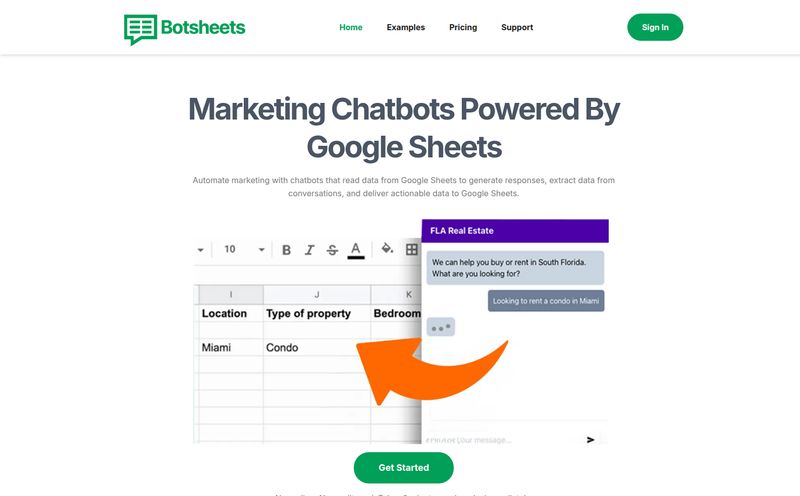I’ve been in the trenches of digital marketing and SEO for years, and if there’s one thing I’ve learned, it’s that efficiency is king. We’re all buried in tasks. For me, it's keyword research and analytics reports. For you, in the legal world, it’s probably a mountain of paperwork that makes my spreadsheets look like a postcard. We’re talking case notes, client intake, depositions, contracts... it’s a never-ending flood of words that all need to be perfectly transcribed, formatted, and filed. One slip-up, one typo, can have serious consequences.
So, when a tool like Legal Intern AI pops up on my radar, my curiosity gets the better of me. It bills itself as an AI-powered solution for law firms, designed to automate all that tedious documentation. An AI intern, essentially. One that doesn’t need coffee, doesn't ask for time off, and theoretically, doesn’t make mistakes. But does it live up to the hype? Let’s get into it.
What Exactly is Legal Intern AI?
At its heart, Legal Intern AI is a sophisticated speech-to-text platform built specifically for the legal industry. You talk, it types. But it's a bit more than just a dictation machine. The idea is you can record your thoughts, client meetings, or verbal notes, and the AI will convert them into secure, properly structured legal documents. Think of it as a bridge between a spoken thought and a filed document, cutting out the manual typing stage entirely.
The platform’s big promise is built on three pillars: speed, accuracy, and security. For any law firm, that’s the holy trinity. It’s designed to be the digital equivalent of that star intern you wish you could clone—the one who just gets it without needing endless instructions.
The Core Problem It Tries to Solve
Let's be real. The page on their site that says, "Human errors in documentation cost time and money," is probably the biggest understatement in the legal field. I remember a friend of mine, a real estate lawyer, telling me a horror story about a single misplaced decimal point in a contract that almost scuttled a seven-figure deal. It took days of frantic, hair-pulling work to fix. That's the kind of high-stakes environment we're talking about.
Manual documentation is not just slow; it’s risky. People get tired. Minds wander. A paralegal who’s been staring at screens for ten hours straight is more likely to mistype a name or a date than one who’s fresh. Legal Intern AI aims to take that fatigue-driven risk off the table. By automating the initial draft, it frees up your human talent—your actual lawyers and paralegals—to focus on the stuff that requires a human brain: strategy, client relations, and complex legal analysis.
How It Works in Practice (The Three-Step Dance)
The process, as laid out on their website, seems refreshingly simple. I appreciate a good, clean user interface, and from the looks of it, they’ve avoided the clutter that plagues so many B2B tools. It boils down to a simple three-step dance:
- Record or Upload: You can either record your audio directly into the platform or upload an existing audio file. This flexibility is nice. You could record notes in your car after a client meeting (hands-free, of course!) and upload it back at the office.
- Let the AI Do Its Thing: The platform’s AI gets to work, transcribing the audio. This is where the magic is supposed to happen, turning your spoken words into a coherent text document.
- Review and Customize: Once the AI has produced the draft, you review it, make any necessary edits, and then download it. This last step is absolutley critical, and we’ll talk more about that in a second.

Visit Legal Intern AI
It’s a straightforward workflow that makes sense. The goal isn’t to remove the human entirely, but to eliminate the most time-consuming, lowest-value part of the process: the physical act of typing.
The Good, The Bad, and The AI
No tool is perfect. As an SEO, I see tools that promise page-one rankings with a single click—and I know it’s never that simple. The same skepticism should be applied here. So let's look at the genuine bright spots and the potential snags.
Where It Shines: The Upsides of an AI Intern
The most obvious win here is the sheer amount of time you could get back. Think about all the hours spent transcribing audio from depositions or client interviews. Giving that task to an AI is a massive productivity boost. It’s about working smarter, not harder, a cliché I usually hate but it actually fits here. The promise of consistent, high-quality work without needing to train a new hire every six months is also compelling. And then there's the security angle. Using a random, free transcription website to handle sensitive client information is a malpractice suit waiting to happen. Legal Intern AI's emphasis on advanced security features is a huge selling point. They seem to understand that for lawyers, confidentiality is not just a feature; it's an ethical obligation. To top it off, they offer a 14-day money-back guarantee, which shows they have some confidence in their product. It lowers the barrier to entry for firms that might be on the fence.
Potential Hiccups and Reality Checks
Okay, let's ground ourselves. The biggest asterisk here is the reliance on AI accuracy. An AI is only as good as its training data. While it might be fantastic at standard legal phrasing, it could potentially stumble over complex, niche-specific terminology, strong accents, or situations with a lot of background noise. Some have argued that these tools are still in their infancy, and I tend to agree to an extent. The "Review and Customize" step isn't just a suggestion; it's a professional necessity. You cannot, and should not, just trust the AI's output blindly and send it off. Think of the AI as a very fast, slightly naive first-year associate. It does the grunt work, but a senior partner (you) needs to review everything before it sees the light of day. This is the human-in-the-loop model, and it's the only responsible way to use this kind of tech in a high-stakes field like law.
Let's Talk Money… Or Not? The Pricing Mystery
This is where things get a bit weird. I went looking for their pricing page, as I always do. And… 404. Page Not Found.
There is no public pricing information available. Now, in my experience, this usually means one of two things. Either the product is so new that they haven't finalized their pricing tiers yet, or they're targeting enterprise-level clients with a "contact us for a custom quote" model. It's a common strategy in B2B SaaS, but I have to admit, it’s a personal pet peeve. I prefer transparent pricing. It builds trust. The lack of it here is a point of friction. It makes it harder for a small firm or a solo practitioner to quickly figure out if this is even in their budget. My advice? Use that 14-day guarantee as your trial period and get a firm quote in writing before you commit to anything.
Who Is This Really For?
So, who should be sending an email to [email protected]? I see a few perfect fits.
Solo practitioners and small firms are the most obvious beneficiaries. For them, time is literally money, and they often lack the resources for a dedicated administrative assistant or paralegal. This tool could be a game-changer, handling hours of work for what is likely less than the cost of a part-time employee.
Mid-sized firms looking to improve efficiency without increasing headcount could also find a lot of value. It could standardize documentation processes across different teams and reduce the administrative load on their highly-paid lawyers.
Who isn't it for? Maybe a massive, old-school firm that already has a deeply entrenched, multi-layered system of stenographers and administrative staff. Changing their workflow might be like trying to turn a battleship in a bathtub. But even then, I bet a few forward-thinking partners are looking at tools like this and seeing the future.
Frequently Asked Questions (The Stuff You're Probably Googling Anyway)
How does the AI actually create the documents?
It uses advanced speech-to-text algorithms, likely trained on a large dataset of legal language, to transcribe your spoken words. It then probably applies templates or formatting rules to structure the text into a document format, like a memo or a client note.
Is my client data really secure with Legal Intern AI?
They claim to use advanced security features specifically for sensitive client information. While you'd need to read their specific privacy policy and data handling agreements (which you should always do!), a platform built for law firms is inherently going to be more secure than a generic, free consumer tool. The focus on security is one of its main selling points.
Can it handle different types of legal documents?
The website suggests it's versatile, but the specifics aren't detailed. It would likely excel at things like transcribing depositions, client intake notes, and internal memos. For highly complex, template-heavy documents like specific motions or contracts, you would definately need to do heavy editing and formatting after the initial transcription.
How accurate is the transcription? Do I still need to proofread?
Yes, absolutely, one hundred percent. No AI is infallible. Think of it as generating a first draft. It will likely be 95-99% accurate in ideal conditions, but you are the final checkpoint. You must review for accuracy, context, and nuance—especially with names, dates, and specific legal terms.
How fast can a law firm get started with this?
Given the simple 3-step process and the 14-day guarantee, it seems designed for quick adoption. You could likely be up and running within a day, testing it with a few non-critical audio files to see how it performs before integrating it more deeply into your workflow.
My Final Verdict
So, is Legal Intern AI the future? I think it's a very clear and powerful glimpse of it. It’s not about replacing lawyers or paralegals, but about augmenting them. It’s a force multiplier. It takes the most robotic, error-prone tasks off their plate, allowing them to focus on the high-value work that a machine can’t do.
The lack of pricing is a hurdle, for sure. And the unshakeable need for human oversight means it's not a 'set it and forget it' solution. But for the right kind of law practice—one that’s nimble, tech-curious, and drowning in dictation—this could be a profoundly useful tool. It’s a smart investment in your most valuable resource: your time.
At the very least, it's an intern that will never, ever finish the last of the coffee.
Reference and Sources
- Legal Intern AI Official Website
- ABA Center for Innovation - for further reading on technology in the legal space.



